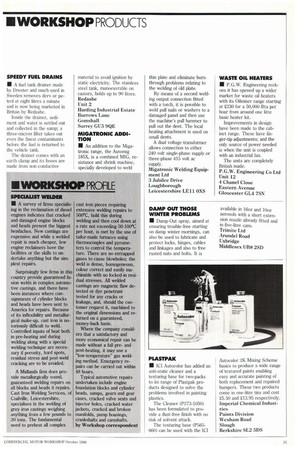III WORKSHOP PROFILE
Page 129

If you've noticed an error in this article please click here to report it so we can fix it.
SPECIALIST WELDER In A survey of firms specialising in the reclamation of diesel engines indicates that cracked and damaged engine blocks and heads present the biggest headaches. New castings are expensive and while a welded repair is much cheaper, few engine reclaimers have the facilities or the skills to undertake anything but the simplest repairs.
Surprisingly few firms in this country provide guaranteed fusion welds in complex automotive castings, and there have been instances where consignments of cylinder blocks and heads have been sent to America for repairs. Because of its inflexibility and metallurgical make-up, cast iron is notoriously difficult to weld. Controlled inputs of heat both in pre-heating and during welding along with a special welding technique are necessary if porosity. hard spots, residual stress and post-weld cracking are to be avoided.
A Midlands firm does provide metallurgically sound, guaranteed welding repairs on -all blocks and heads it repairs. H Cast Iron Welding Services, of Coalville, Leicestershire, specialises in the welding of grey iron castings weighing anything from a few pounds to 20 tons. The fundamental ;need to preheat all complex
cast iron pieces requiring extensive welding repairs to 500°C, hold this during welding and then cool down at a rate not exceeding 50-100°C per hour, is met by the use of tailor-made furnaces using thermocouples and pyrometers to control the temperature. There are no entrapped gases to cause blowholes; the weld is dense, homogeneous, colour correct and easily machinable with no locked-in residual stresses. All welded castings are magnetic flaw detected or dye penetrant tested for any cracks or leakage, and, should the customer request it, machined to the original dimensions and returned on a guaranteed, money-back basis.
Where the company considers that a satisfactory and more economical repair can be made without a full preand post-heating, it may use a "low-temperature" gas welding method. Emergency repairs can be carried out within 48 hours.
Typical automotive repairs undertaken include engine foundation blocks and cylinder heads, sumps, gears and gear cases, cracked valve seats and injector holes, cracked water jackets, cracked and broken manifolds, pump housings, crankshafts and camshafts. by Workshop correspondent




































































































































